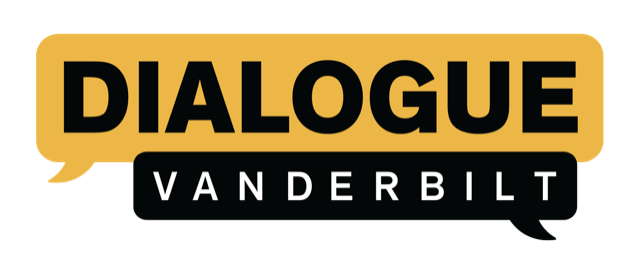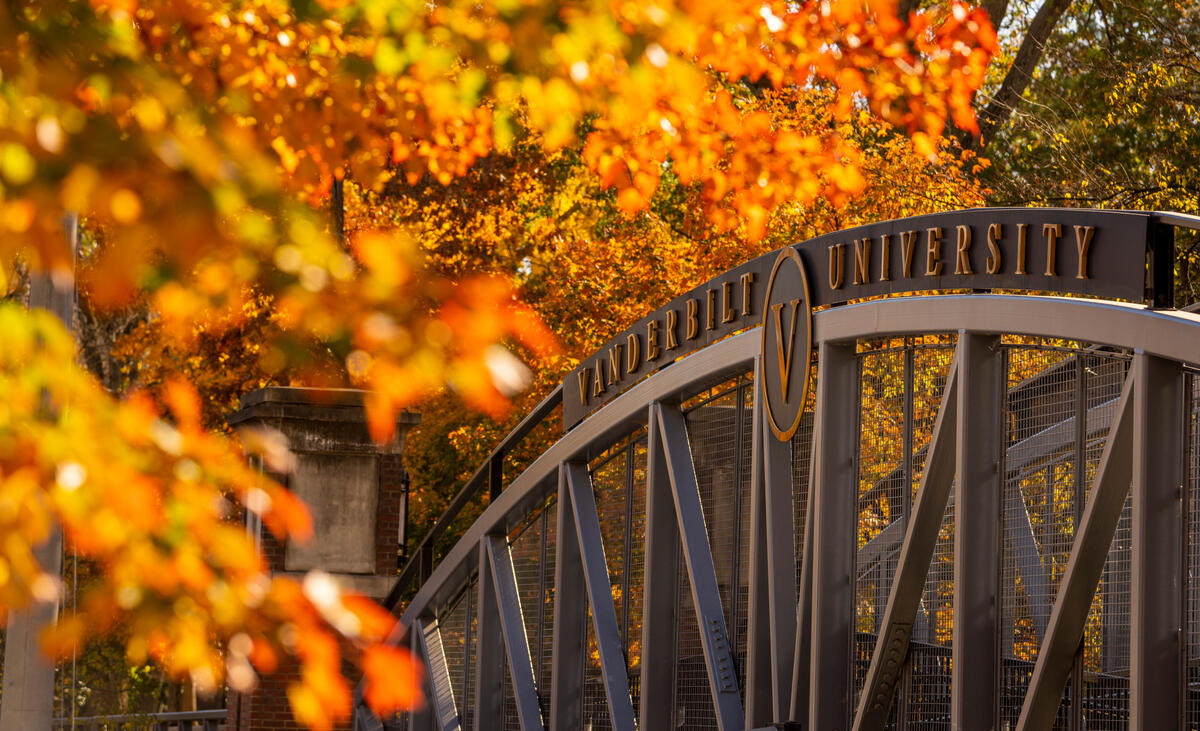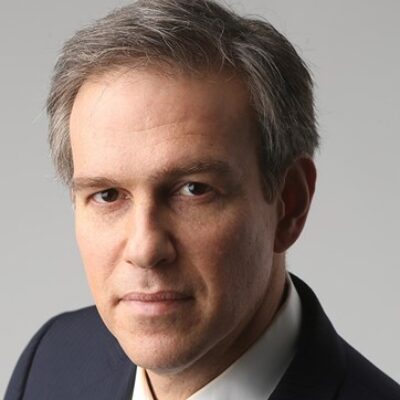Vanderbilt celebrated its “bedrock principle” of free speech through a series of panels and discussions Oct. 10–17 during the university’s inaugural celebration of national Free Speech Week. The campus-wide event, which included the two-day Symposium on AI, Free Speech and Human Rights, featured leading experts from academia, industry, civil society, government and media. Free Speech Week was held in support of the recently launched Dialogue Vanderbilt initiative.
In remarks at the symposium on Oct. 12, Chancellor Daniel Diermeier acknowledged the ongoing conflict between Israel and Hamas that had overshadowed world events for much of the week.
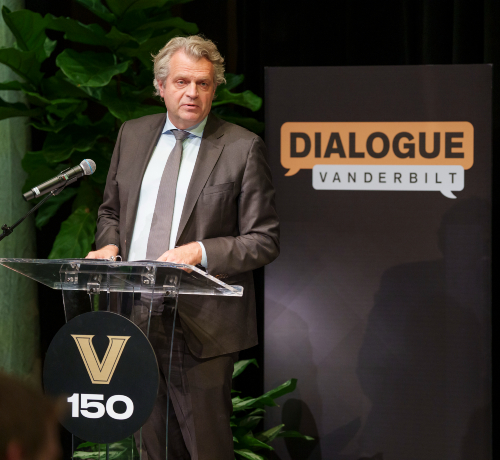
at Rothschild College on Oct. 16, 2023. (Harrison McClary/Vanderbilt)
“We, here at Vanderbilt, extend our heartfelt sympathy to all who have lost loved ones in the violence and all who are now in harm’s way,” he said. “As a university, we are committed to promoting and enhancing the much-needed debate and informed understanding that serves as one of the great antidotes to hatred and violence.
“Gatherings like this one, in which people with diverse perspectives come together seeking greater understanding and collaboration, strengthen—in their own small but important way—the cause of collaboration and mutual understanding,” he said.
At the Dialogue Vanderbilt event on Oct. 16, Diermeier commended Vanderbilt students for their thoughtful and measured response to the week’s events. “Students with different perspectives and different points of view organized events to make their views known. And while the debates on our campus might be passionate, in the end we treat each other with decency and respect, never losing sight of our common goals and our common purpose—or our shared humanity,” he said.
Diermeier relayed a favorite quote by his predecessor Alexander Heard, Vanderbilt’s fifth chancellor: “A university’s obligation is not to protect students from ideas, but rather to expose them to ideas and to help make them capable of handling and, hopefully, having ideas of their own.”
“More than five decades later, we live by this principle, and it is why we created Dialogue Vanderbilt,” Diermeier said. “Through Dialogue Vanderbilt we’re teaching our first-year students and other members of our university community how to engage in constructive conversation even—and especially—when they disagree.
“A college campus might be the last, best place where we can learn to converse, cooperate, discuss and coexist,” he said.
Symposium on AI, Free Speech and Human Rights
Jacob Mchangama, founder and executive director of The Future of Free Speech Project and research professor of political science at Vanderbilt, opened the Symposium on AI, Free Speech and Human Rights at the John Seigenthaler Center on Oct. 12 by urging participants to consider the ramifications of generative AI with equal parts urgency and caution, skepticism and optimism.
“In terms of quantity, there can be no doubt that generative AI helps facilitate speech at an unprecedented scale, supercharging the already exponential leaps in available information made possible by the internet and social media,” Mchangama said. “But what about the quality of AI-generated speech? Can we trust AI systems to avoid the worst forms of hallucinations and to provide accurate information, to improve our critical thinking and bolster our creativity and capability of generating new and important ideas?
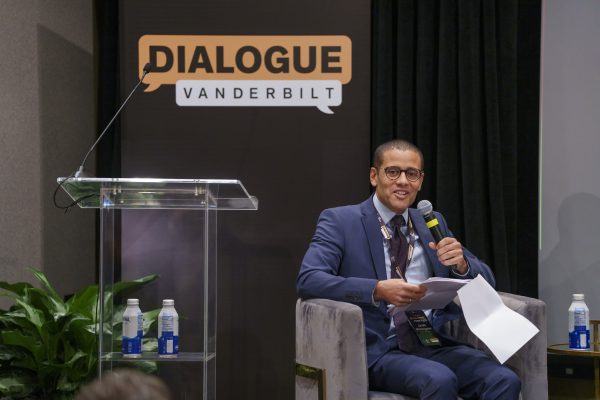
“Or will AI systems be incentivized to prod our dark sides and reward propaganda, sensationalism and hatred?” he continued. “Will governments weaponize AI systems to combine conformity, censorship and surveillance? And how can we ensure proper guard rails without the cure becoming worse than the disease?”
Panic over new technological developments is nothing new, said Mchangama, who noted that the printing press, telegraph and internet each were met with trepidation by leading thinkers and influential leaders when they were introduced.
“But AI may be a different category altogether,” he said. “It might be the first time in human history that a new communications technology does not depend—or, at least, depends very little—on human input.
“Whatever the future of free speech in the age of AI, our best chance of making it one that benefits our species is to engage with these difficult issues head-on,” he said.
‘AI, Disinformation and Free Speech’ keynote by Max Tegmark
Massachusetts Institute of Technology Professor Max Tegmark touched on similar themes during his symposium keynote, “AI, Disinformation and Free Speech,” on Oct. 13. Tegmark conducts physics and machine learning research at MIT’s Institute for Artificial Intelligence and Fundamental Interactions and the Center for Brains, Minds and Machines. He also serves as president of the nonprofit Future of Life Institute, the mission of which is “to steer transformative technology towards benefitting life and away from extreme large-scale risks.”
“Though many people think of free speech as a partisan issue—left versus right—it really isn’t,” Tegmark said. “The reason I feel so passionately that we need free speech has nothing at all to do with politics. It’s because I think it’s absolutely quintessential for a functioning democracy … and it’s also quintessential in the search for truth, which is what science is all about.”
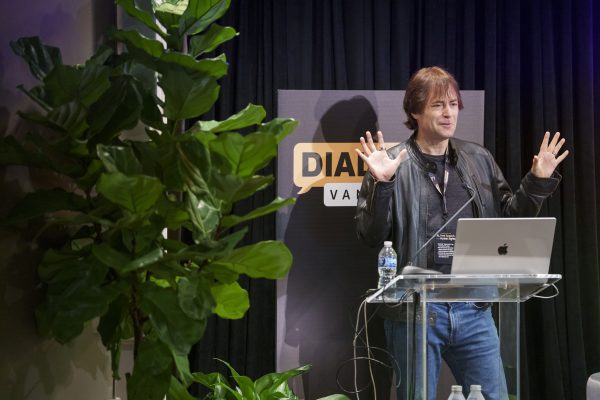
Rapid advancements in artificial intelligence have greatly democratized the ability to create doctored photos, deep fake videos and audio and AI-generated images, which are proliferating online, Tegmark said. But combating such disinformation doesn’t have a one-size-fits-all solution—especially when the lines between anti-disinformation, censorship and propaganda are so finely drawn.
“It should be a human right to know whether you are interacting with a human being [online] or not,” he said. “But figuring out the truth is hard. As a scientist, I’m particularly humble. We spent 300 years with the smartest scientists on Earth believing in the wrong theory of gravity until Einstein came along.”
Calling it “wholly inappropriate” to designate governments or corporations as the arbiters of truth, Tegmark said the best truth-finding system that humans have available to them is science.
“The lesson here is to never give any powerful authority … any special influence over fact checking. This is lesson No. 1 from science,” he said. “Science is very humble. It doesn’t matter whether you’re rich or poor, whether you’re a king or just some random dude. Nobody gets a free pass to be believed because of their title or position. Science is very, very ruthlessly democratic this way.”
Tegmark said he is committed to using AI to help people discern truth for themselves, including developing free tools such as Improvethenews.org. The apolitical news site he founded aims to counter misuses of artificial intelligence that have resulted in a distorted online news environment, where alternative facts often overshadow scientific truths and fractured narratives contribute to social discord.
Dialogue Vanderbilt conversation featuring Bret Stephens and Samar Ali
The exercise of free speech, in many ways, is a scientific process, said New York Times opinion columnist Bret Stephens, who participated in a Dialogue Vanderbilt conversation with Samar Ali, co-chair of The Vanderbilt Project on Unity and American Democracy and research professor of political science and law, at Rothschild College on Oct. 16.
Promising the audience “a complex conversation for a complex time,” Ali asked Stephens to define free speech.
“I think of free speech as the great enabler of intellectual challenge, intellectual thought and, ultimately, progress,” he said. “If you cannot speak freely, you will not be able to think clearly.”
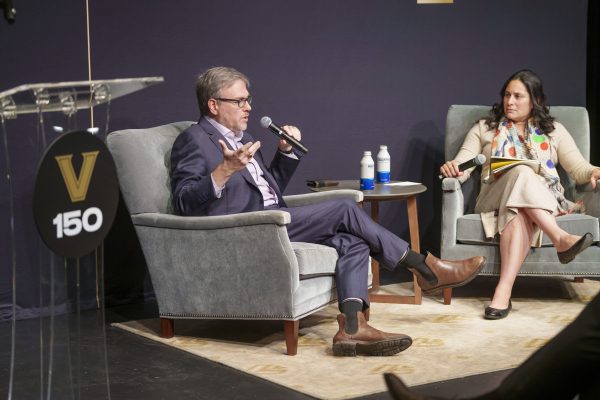
The goal of a great university, like Vanderbilt, is intellectual excellence, Stephens said. That cannot be achieved unless people are allowed to put forward ideas that inevitably will be uninformed and even hurtful at times.
“Just in the way that science proceeds through trial and error … in order to think more clearly, at some point people have to make erroneous statements, stupid statements, so they can be contradicted, so they can be educated, so that conversations and dialogues and debates and even arguments can happen,” he said. “Without that, you’re essentially not so much on the road to less freedom, you’re on the road to mediocrity. And that’s something I think universities really need to fear.”
For free speech to thrive, we must be willing to practice forbearance, curiosity, compassion and candor. “There are a whole series of habits of mind that go with a culture of free speech that encourage conversation and engagement,” Stephens said.
“But as American culture has receded from a kind of default position in favor of free speech, our conversations have actually become more rancorous, not less,” he said. “We have forgotten how to speak across differences. People are never sure whether they’re going to put the foot wrong, and if they do … others feel they’re entitled not to engage them, but to pour scorn on them.”
The Pulitzer Prize winner described instances when he took hardline positions in his writing that were challenged by specific readers. After meaningful engagement with them, Stephens expanded his viewpoint and revisited the topics in print. “And it felt good for my soul,” he said. “It felt good to do a deep re-think and to say so publicly.”
Stephens’ commitment to free speech stems from his family history, he said. His mother was born into hiding in Nazi-occupied Europe and came to the U.S. as a 10-year-old displaced person.
“I take seriously the privilege of being able to think out loud and be myself out loud,” he said. “That we have these liberties in the United States … plays a role in the way I think about the world.”
For more about free expression at Vanderbilt, visit vanderbilt.edu/free-expression.
